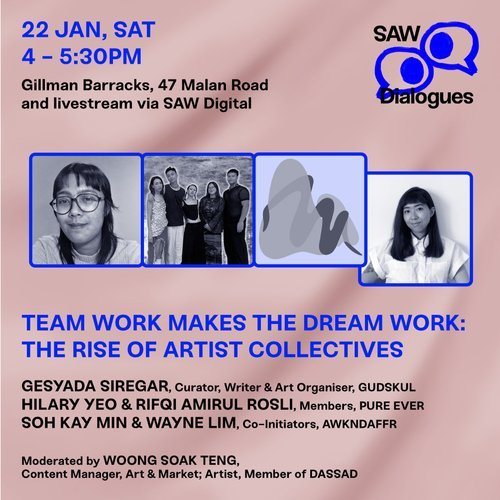SAW Dialogues 2022 | The Pleasures and Pains of Archiving
Chew Tee Pao, Chương-Đài Võ, farid rakun, Tutik Indras Oktafia, Vivyan Yeo
By Sara Lau
Screenshot of talk. Clockwise from left: Chương-Đài Võ, Researcher, Asia Art Archive, Chew Tee Pao, Archivist, Asian Film Archive, Vivyan Yeo, Content Producer, Art & Market, Tutik Indras Oktafia, Archivist, GUDSKUL and farid rakun, Researcher and Education Coordinator, GUDSKUL / ruangrupa.
Key points:
Collaboration is at the heart of archival work.
Beyond conservation and preservation, accessibility is also a key focus for archives.
The archives are continuously activated through knowledge production, programming and pedagogy.
Archival work is laborious and often underappreciated, but ultimately offers its own rewards.
‘The Pleasures and Pains of Archiving’, a part of SAW Dialogues, took place on 16 January from 2pm. It was a robust discussion on the methods, rewards and challenges of archival work and its significance in the arts and cultural landscape. The panel featured Chew Tee Pao, Archivist, Asian Film Archive, Chương-Đài Võ, Researcher, Asia Art Archive, farid rakun, Researcher and Education Coordinator, GUDSKUL / ruangrupa and Tutik Indras Oktafia, Archivist, GUDSKUL. The session was moderated by Vivyan Yeo, Content Producer, A&M.
Here are the takeaways:
Collaboration is at the heart of archival work. Throughout the session, many examples were raised about how collaboration with researchers, academics, institutions and the public were key to the work executed by the respective archives. Chương-Đài brought up Asia Art Archive (AAA)’s Lee Wen project, an archive that is currently being supported by National Gallery Singapore through staff support, digitisation resources and more. For the Asian Film Archive (AFA), Tee Pao noted that much of their work requires collaboration with filmmakers, cinema operators, researchers and the general public, whether it’s rescuing old film reels or commissioning programmes around a specific film. Indras stated that while GUDSKUL is still in the midst of organising internally, they are still open to collaboration to present or activate their archives. When asked about a “dream archive”, farid raised the possibility of an “archive festival” that would be co-authored and co-owned by members of the public, an extension of GUDSKUL’s collaborative and collectivist philosophy.
Beyond conservation and preservation, accessibility is also a key focus for archives. For most of the speakers, accessibility was largely conceptualised around digital access, which became increasingly important over the last two years. Tee Pao spoke about AFA’s digital initiatives, the film series ‘Rewired’ and essay collection ‘Monographs’, both of which were meant to maintain public engagement throughout the pandemic. Indras from GUDSKUL said that at the moment, the primary goal is to make their archives accessible internally across the different nodes that make up their network, before expanding access to the public and internationally as well. In contrast, Chương-Đài pointed out that AAA has always had several of its collections available online alongside its physical library. She elaborated that the team continues to work towards making more materials available to everyone, with the hope that the research and programmes spawned from these materials help to build upon the themes and ideas prioritised by AAA.
The archives are continuously activated through knowledge production, programming and pedagogy. Chương-Đài cited AAA’s ‘Art Schools of Asia’ programme, an online seminar series that aims to develop a methodology and theory for thinking about the history of art schools in the region by exploring and utilising AAA’s materials, working with both emerging and established scholars. Similarly, the Lee Wen archive gets activated through various programmes, such as the exhibition ‘Form Colour Action’ (2019), which explored the drawings found in Lee Wen’s notebooks and sketchbooks and how they provide insight into the artist’s foundation and the relationship between mark-making and performance art. Tee Pao noted how AFA also documents the programmes, objects, writings and artworks spawned from a film, allowing for the archive to continuously expand instead of remaining static.
Indras and farid talked about GUDSKUL’s slightly different approach. Their archives are constantly being created and morphed through engagement with students and other individuals through platforms such as Contemporary Art Collective and Ecosystem Studies. This platform also allows for the collectives that make up GUDSKUL to make known the history of collective action and collaborative art practices in Indonesia, including alternate approaches to archival work that are more open and nebulous.
Archival work is laborious and often underappreciated, but ultimately offers its own rewards. Tee Pao expressed that people often assume that archival work has been made easier due to the digital age, when in fact born-digital artefacts and films require a lot more labour and resources to maintain. He also highlighted that people forget the importance of archival work until something is forever lost to time and becomes unsalvageable. That said, all the speakers concurred that they found their work rewarding in one way or the other. Tee Pao brought up the example of ‘Bambaru Avith (The Wasps Are Here)’ by Sri Lankan director Dharmasena Pathiraja, a film that expanded a lot of resources in the process of restoration, and his personal gratification when it was selected for Cannes Classics at the 73rd Cannes Film Festival in 2020. Chương-Đài finds joy in speaking to the artists whose archives she works with, as well as the insights gained from the archives that can be made relevant to contemporary times. One example is the Manila Artist-Run Spaces Archive, which helped her understand the beginnings of Manila’s art scene between the 1980s to the 2000s, and the various strategies of survival that could help current spaces thrive as well. Indras pronounced that while she does not feel like she has had any significant achievements yet, she does enjoy the daily process of archival work as well as the challenge of working with artists who have different values and philosophies.
Overall, the panel discussion gave an insightful look into the work that goes into growing and maintaining an archive, while also sharing the various permutations and formats that an archive can take. Moving forward, archives will have to continue tackling challenges of accessibility, digitisation and preserving born-digital works.
Watch the full recording of ‘SAW Dialogues 2022 | The Pleasures and Pains of Archiving’ here:
You can also listen to it as a podcast here:
About the writer:
Sara Lau is a writer with overlapping interests in visual and performing arts, ethnographic narratives and cultural histories. She enjoys writing in all its permutations, particularly poetry and creative non-fiction. In 2019, she graduated from the National University of Singapore with a degree in Sociology and a second major in Southeast Asian studies. By day, she works as a content marketing executive















